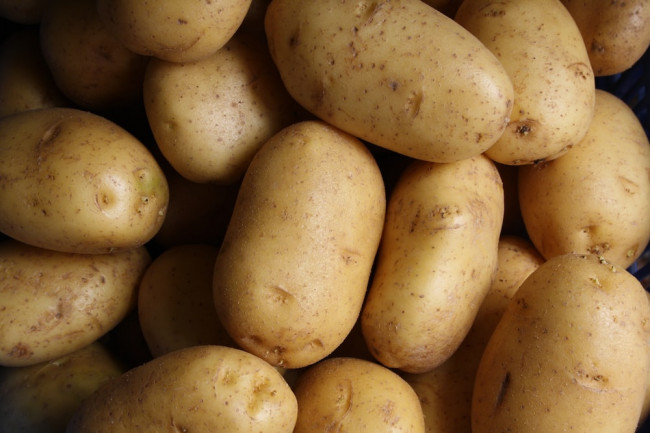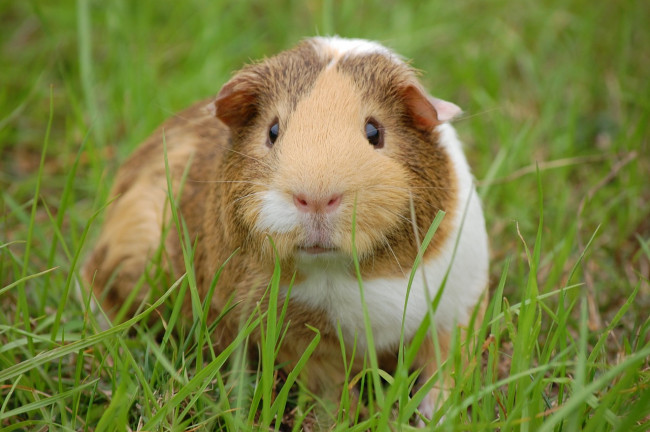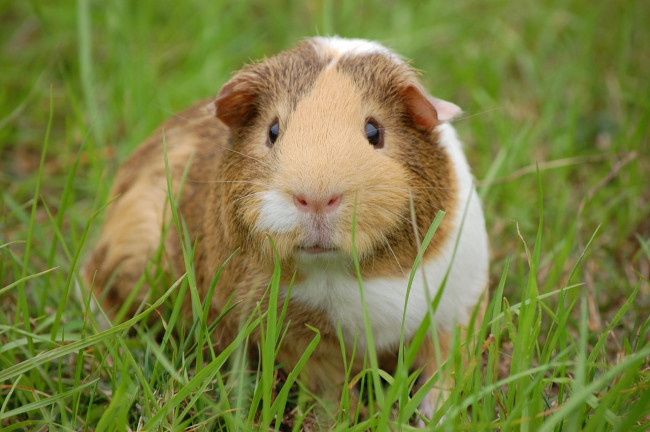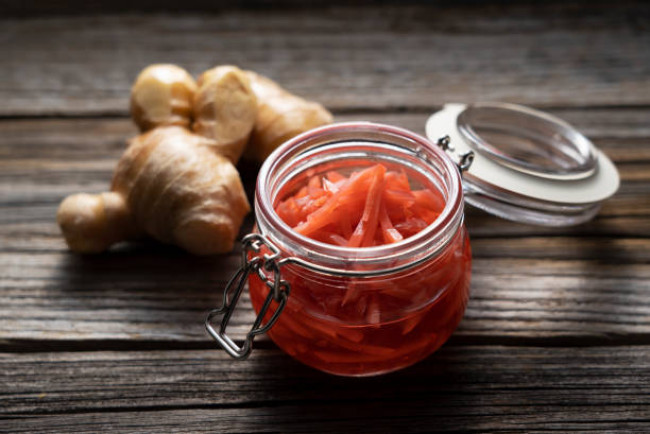Can Guinea Pigs Eat Bell Peppers? A Crunchy and Colorful Treat!
Introduction
Guinea pigs, those adorable little furballs, are known for their voracious appetites. But when it comes to their diet, it's essential to ensure they're munching on the right foods. One question that often pops up in guinea pig owner's minds is, "Can guinea pigs ea news is that guinea pigs can enjoy bell peppers as a tasty and nutritious treat. In this blog, we'll explore the many benefits of including bell peppers in your guinea pig's diet, along with some important guidelines to keep them healthy and happy.

Can Guinea Pigs Eat Bell Peppers
The Nutritional Benefits
Bell peppers are a delightful addition to your guinea pig's diet because of their impressive nutritional content. These colorful veggies are packed with vitamins and minerals that can support your furry friend's overall health.
Vitamin C: Guinea pigs are unable to produce their own vitamin C, so they rely on their diet to meet this essential requirement. Bell peppers are a fantastic source of vitamin C, which is vital for maintaining their immune system, promoting healthy skin, and preventing scurvy.
Fiber: Bell peppers contain dietary fiber, which aids in digestion and keeps your guinea pig's gut happy. Proper digestion is crucial for preventing digestive problems like bloating and constipation.
Vitamin A: Bell peppers are rich in vitamin A, promoting healthy eyesight and skin for your guinea pig.
Low in Sugar: Bell peppers are relatively low in sugar compared to some other fruits and vegetables, making them a safe choice for guinea pigs without causing weight issues.
Hydration: These veggies also have a high water content, helping to keep your guinea pig hydrated.
The Importance of Variety
While bell peppers are a healthy choice for guinea pigs, it's crucial to remember the importance of a balanced diet. Guinea pigs require a variety of fruits, vegetables, hay, and pellets to meet all their nutritional needs. Bell peppers should be part of their diet, not the sole focus.
Preparing Bell Peppers for Guinea Pigs
When introducing bell peppers to your guinea pig's diet, follow these steps:
Wash Thoroughly: Wash the bell pepper thoroughly to remove any pesticides or chemicals that may be present.
Remove Seeds and Stem: Cut out the seeds and stem, as these parts can be difficult for guinea pigs to digest.
Cut into Strips or Cubes: Slice the bell pepper into small strips or cubes to make it easier for your guinea pig to eat.
Feeding Guidelines
Portion Control: Offer a small portion of bell pepper, typically around one or two small strips or cubes, 2-3 times a week. Avoid overfeeding, as excessive consumption can lead to digestive issues.
Observe Your Guinea Pig: Pay attention to how your guinea pig reacts to bell peppers. If they have any adverse reactions, like diarrhea or gas, reduce the quantity or discontinue offering bell peppers.
Freshness Matters: Serve fresh bell peppers to ensure your guinea pig gets the maximum nutritional benefits.
In Conclusion
Yes, guinea pigs can eat bell peppers, and it's an excellent addition to their diet. These colorful veggies are a tasty way to provide essential vitamins and minerals, particularly vitamin C, to your furry friends. Just remember to maintain a balanced diet, practice portion control, and keep an eye on how your guinea pig reacts to this new treat. With the right care, your guinea pig can enjoy the crunch and flavor of bell peppers while staying happy and healthy.
ir diet to meet this essential requirement. Bell peppers are a fantastic source of vitamin C, which is vital for maintaining their immune system, promoting healthy skin, and preventing scurvy.
Fiber: Bell peppers contain dietary fiber, which aids in digestion and keeps your guinea pig's gut happy. Proper digestion is crucial for preventing digestive problems like bloating and constipation.
Vitamin A: Bell peppers are rich in vitamin A, promoting healthy eyesight and skin for your guinea pig.
Low in Sugar: Bell peppers are relatively low in sugar compared to some other fruits and vegetables, making them a safe choice for guinea pigs without causing weight issues.
Hydration: These veggies also have a high water content, helping to keep your guinea pig hydrated.
The Importance of Variety
While bell peppers are a healthy choice for guinea pigs, it's crucial to remember the importance of a balanced diet. Guinea pigs require a variety of fruits, vegetables, hay, and pellets to meet all their nutritional needs. Bell peppers should be part of their diet, not the sole focus.
Preparing Bell Peppers for Guinea Pigs
When introducing bell peppers to your guinea pig's diet, follow these steps:
Wash Thoroughly: Wash the bell pepper thoroughly to remove any pesticides or chemicals that may be present.
Remove Seeds and Stem: Cut out the seeds and stem, as these parts can be difficult for guinea pigs to digest.
Cut into Strips or Cubes: Slice the bell pepper into small strips or cubes to make it easier for your guinea pig to eat.
Feeding Guidelines
Portion Control: Offer a small portion of bell pepper, typically around one or two small strips or cubes, 2-3 times a week. Avoid overfeeding, as excessive consumption can lead to digestive issues.
Observe Your Guinea Pig: Pay attention to how your guinea pig reacts to bell peppers. If they have any adverse reactions, like diarrhea or gas, reduce the quantity or discontinue offering bell peppers.
Freshness Matters: Serve fresh bell peppers to ensure your guinea pig gets the maximum nutritional benefits.
In Conclusion
Yes, guinea pigs can eat bell peppers, and it's an excellent addition to their diet. These colorful veggies are a tasty way to provide essential vitamins and minerals, particularly vitamin C, to your furry friends. Just remember to maintain a balanced diet, practice portion control, and keep an eye on how your guinea pig reacts to this new treat. With the right care, your guinea pig can enjoy the crunch and flavor of bell peppers while staying happy and healthy.
ir diet to meet this essential requirement. Bell peppers are a fantastic source of vitamin C, which is vital for maintaining their immune system, promoting healthy skin, and preventing scurvy.
Fiber: Bell peppers contain dietary fiber, which aids in digestion and keeps your guinea pig's gut happy. Proper digestion is crucial for preventing digestive problems like bloating and constipation.
Vitamin A: Bell peppers are rich in vitamin A, promoting healthy eyesight and skin for your guinea pig.
Low in Sugar: Bell peppers are relatively low in sugar compared to some other fruits and vegetables, making them a safe choice for guinea pigs without causing weight issues.
Hydration: These veggies also have a high water content, helping to keep your guinea pig hydrated.
The Importance of Variety
While bell peppers are a healthy choice for guinea pigs, it's crucial to remember the importance of a balanced diet. Guinea pigs require a variety of fruits, vegetables, hay, and pellets to meet all their nutritional needs. Bell peppers should be part of their diet, not the sole focus.
Preparing Bell Peppers for Guinea Pigs
When introducing bell peppers to your guinea pig's diet, follow these steps:
Wash Thoroughly: Wash the bell pepper thoroughly to remove any pesticides or chemicals that may be present.
Remove Seeds and Stem: Cut out the seeds and stem, as these parts can be difficult for guinea pigs to digest.
Cut into Strips or Cubes: Slice the bell pepper into small strips or cubes to make it easier for your guinea pig to eat.
Feeding Guidelines
Portion Control: Offer a small portion of bell pepper, typically around one or two small strips or cubes, 2-3 times a week. Avoid overfeeding, as excessive consumption can lead to digestive issues.
Observe Your Guinea Pig: Pay attention to how your guinea pig reacts to bell peppers. If they have any adverse reactions, like diarrhea or gas, reduce the quantity or discontinue offering bell peppers.
Freshness Matters: Serve fresh bell peppers to ensure your guinea pig gets the maximum nutritional benefits.
In Conclusion
Yes, guinea pigs can eat bell peppers, and it's an excellent addition to their diet. These colorful veggies are a tasty way to provide essential vitamins and minerals, particularly vitamin C, to your furry friends. Just remember to maintain a balanced diet, practice portion control, and keep an eye on how your guinea pig reacts to this new treat. With the right care, your guinea pig can enjoy the crunch and flavor of bell peppers while staying happy and healthy.
ir diet to meet this essential requirement. Bell peppers are a fantastic source of vitamin C, which is vital for maintaining their immune system, promoting healthy skin, and preventing scurvy.
Fiber: Bell peppers contain dietary fiber, which aids in digestion and keeps your guinea pig's gut happy. Proper digestion is crucial for preventing digestive problems like bloating and constipation.
Vitamin A: Bell peppers are rich in vitamin A, promoting healthy eyesight and skin for your guinea pig.
Low in Sugar: Bell peppers are relatively low in sugar compared to some other fruits and vegetables, making them a safe choice for guinea pigs without causing weight issues.
Hydration: These veggies also have a high water content, helping to keep your guinea pig hydrated.
The Importance of Variety
While bell peppers are a healthy choice for guinea pigs, it's crucial to remember the importance of a balanced diet. Guinea pigs require a variety of fruits, vegetables, hay, and pellets to meet all their nutritional needs. Bell peppers should be part of their diet, not the sole focus.
Preparing Bell Peppers for Guinea Pigs
When introducing bell peppers to your guinea pig's diet, follow these steps:
Wash Thoroughly: Wash the bell pepper thoroughly to remove any pesticides or chemicals that may be present.
Remove Seeds and Stem: Cut out the seeds and stem, as these parts can be difficult for guinea pigs to digest.
Cut into Strips or Cubes: Slice the bell pepper into small strips or cubes to make it easier for your guinea pig to eat.
Feeding Guidelines
Portion Control: Offer a small portion of bell pepper, typically around one or two small strips or cubes, 2-3 times a week. Avoid overfeeding, as excessive consumption can lead to digestive issues.
Observe Your Guinea Pig: Pay attention to how your guinea pig reacts to bell peppers. If they have any adverse reactions, like diarrhea or gas, reduce the quantity or discontinue offering bell peppers.
Freshness Matters: Serve fresh bell peppers to ensure your guinea pig gets the maximum nutritional benefits.
In Conclusion
Yes, guinea pigs can eat bell peppers, and it's an excellent addition to their diet. These colorful veggies are a tasty way to provide essential vitamins and minerals, particularly vitamin C, to your furry friends. Just remember to maintain a balanced diet, practice portion control, and keep an eye on how your guinea pig reacts to this new treat. With the right care, your guinea pig can enjoy the crunch and flavor of bell peppers while staying happy and healthy.
ir diet to meet this essential requirement. Bell peppers are a fantastic source of vitamin C, which is vital for maintaining their immune system, promoting healthy skin, and preventing scurvy.
Fiber: Bell peppers contain dietary fiber, which aids in digestion and keeps your guinea pig's gut happy. Proper digestion is crucial for preventing digestive problems like bloating and constipation.
Vitamin A: Bell peppers are rich in vitamin A, promoting healthy eyesight and skin for your guinea pig.
Low in Sugar: Bell peppers are relatively low in sugar compared to some other fruits and vegetables, making them a safe choice for guinea pigs without causing weight issues.
Hydration: These veggies also have a high water content, helping to keep your guinea pig hydrated.
The Importance of Variety
While bell peppers are a healthy choice for guinea pigs, it's crucial to remember the importance of a balanced diet. Guinea pigs require a variety of fruits, vegetables, hay, and pellets to meet all their nutritional needs. Bell peppers should be part of their diet, not the sole focus.
Preparing Bell Peppers for Guinea Pigs
When introducing bell peppers to your guinea pig's diet, follow these steps:
Wash Thoroughly: Wash the bell pepper thoroughly to remove any pesticides or chemicals that may be present.
Remove Seeds and Stem: Cut out the seeds and stem, as these parts can be difficult for guinea pigs to digest.
Cut into Strips or Cubes: Slice the bell pepper into small strips or cubes to make it easier for your guinea pig to eat.
Feeding Guidelines
Portion Control: Offer a small portion of bell pepper, typically around one or two small strips or cubes, 2-3 times a week. Avoid overfeeding, as excessive consumption can lead to digestive issues.
Observe Your Guinea Pig: Pay attention to how your guinea pig reacts to bell peppers. If they have any adverse reactions, like diarrhea or gas, reduce the quantity or discontinue offering bell peppers.
Freshness Matters: Serve fresh bell peppers to ensure your guinea pig gets the maximum nutritional benefits.
In Conclusion
Yes, guinea pigs can eat bell peppers, and it's an excellent addition to their diet. These colorful veggies are a tasty way to provide essential vitamins and minerals, particularly vitamin C, to your furry friends. Just remember to maintain a balanced diet, practice portion control, and keep an eye on how your guinea pig reacts to this new treat. With the right care, your guinea pig can enjoy the crunch and flavor of bell peppers while staying happy and healthy.
ir diet to meet this essential requirement. Bell peppers are a fantastic source of vitamin C, which is vital for maintaining their immune system, promoting healthy skin, and preventing scurvy.
Fiber: Bell peppers contain dietary fiber, which aids in digestion and keeps your guinea pig's gut happy. Proper digestion is crucial for preventing digestive problems like bloating and constipation.
Vitamin A: Bell peppers are rich in vitamin A, promoting healthy eyesight and skin for your guinea pig.
Low in Sugar: Bell peppers are relatively low in sugar compared to some other fruits and vegetables, making them a safe choice for guinea pigs without causing weight issues.
Hydration: These veggies also have a high water content, helping to keep your guinea pig hydrated.
The Importance of Variety
While bell peppers are a healthy choice for guinea pigs, it's crucial to remember the importance of a balanced diet. Guinea pigs require a variety of fruits, vegetables, hay, and pellets to meet all their nutritional needs. Bell peppers should be part of their diet, not the sole focus.
Preparing Bell Peppers for Guinea Pigs
When introducing bell peppers to your guinea pig's diet, follow these steps:
Wash Thoroughly: Wash the bell pepper thoroughly to remove any pesticides or chemicals that may be present.
Remove Seeds and Stem: Cut out the seeds and stem, as these parts can be difficult for guinea pigs to digest.
Cut into Strips or Cubes: Slice the bell pepper into small strips or cubes to make it easier for your guinea pig to eat.
Feeding Guidelines
Portion Control: Offer a small portion of bell pepper, typically around one or two small strips or cubes, 2-3 times a week. Avoid overfeeding, as excessive consumption can lead to digestive issues.
Observe Your Guinea Pig: Pay attention to how your guinea pig reacts to bell peppers. If they have any adverse reactions, like diarrhea or gas, reduce the quantity or discontinue offering bell peppers.
Freshness Matters: Serve fresh bell peppers to ensure your guinea pig gets the maximum nutritional benefits.
In Conclusion
Yes, guinea pigs can eat bell peppers, and it's an excellent addition to their diet. These colorful veggies are a tasty way to provide essential vitamins and minerals, particularly vitamin C, to your furry friends. Just remember to maintain a balanced diet, practice portion control, and keep an eye on how your guinea pig reacts to this new treat. With the right care, your guinea pig can enjoy the crunch and flavor of bell peppers while staying happy and healthy.
ir diet to meet this essential requirement. Bell peppers are a fantastic source of vitamin C, which is vital for maintaining their immune system, promoting healthy skin, and preventing scurvy.
Fiber: Bell peppers contain dietary fiber, which aids in digestion and keeps your guinea pig's gut happy. Proper digestion is crucial for preventing digestive problems like bloating and constipation.
Vitamin A: Bell peppers are rich in vitamin A, promoting healthy eyesight and skin for your guinea pig.
Low in Sugar: Bell peppers are relatively low in sugar compared to some other fruits and vegetables, making them a safe choice for guinea pigs without causing weight issues.
Hydration: These veggies also have a high water content, helping to keep your guinea pig hydrated.
The Importance of Variety
While bell peppers are a healthy choice for guinea pigs, it's crucial to remember the importance of a balanced diet. Guinea pigs require a variety of fruits, vegetables, hay, and pellets to meet all their nutritional needs. Bell peppers should be part of their diet, not the sole focus.
Preparing Bell Peppers for Guinea Pigs
When introducing bell peppers to your guinea pig's diet, follow these steps:
Wash Thoroughly: Wash the bell pepper thoroughly to remove any pesticides or chemicals that may be present.
Remove Seeds and Stem: Cut out the seeds and stem, as these parts can be difficult for guinea pigs to digest.
Cut into Strips or Cubes: Slice the bell pepper into small strips or cubes to make it easier for your guinea pig to eat.
Feeding Guidelines
Portion Control: Offer a small portion of bell pepper, typically around one or two small strips or cubes, 2-3 times a week. Avoid overfeeding, as excessive consumption can lead to digestive issues.
Observe Your Guinea Pig: Pay attention to how your guinea pig reacts to bell peppers. If they have any adverse reactions, like diarrhea or gas, reduce the quantity or discontinue offering bell peppers.
Freshness Matters: Serve fresh bell peppers to ensure your guinea pig gets the maximum nutritional benefits.
In Conclusion
Yes, guinea pigs can eat bell peppers, and it's an excellent addition to their diet. These colorful veggies are a tasty way to provide essential vitamins and minerals, particularly vitamin C, to your furry friends. Just remember to maintain a balanced diet, practice portion control, and keep an eye on how your guinea pig reacts to this new treat. With the right care, your guinea pig can enjoy the crunch and flavor of bell peppers while staying happy and healthy.















